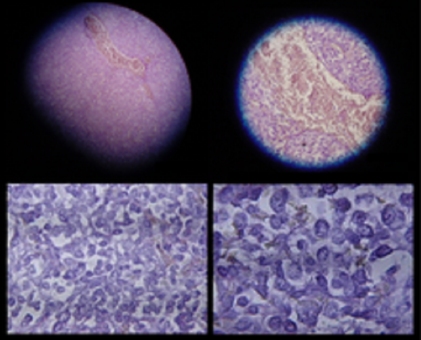Biphasic Mesothelioma - Symptoms and Treatment
Biphasic mesothelioma - sometimes known as mixed mesothelioma - is a combination of epithelioid and sarcomatoid cells. The Symptoms, prognosis and treatment of this type of Mesothelioma will vary depending on which of the two cell types is dominant.

For a biphasic mesothelioma diagnosis, both cell types must account for at least 10% of the cells.
If the minority cell type accounts for less than 10%, then the disease is diagnosed as the majority type.
Approximately 30% of pleural mesothelioma tumours are biphasic and and about 25% of peritoneal tumours.
Biphasic Mesothelioma Symptoms
Not surprisingly, Biphasic mesothelioma symptoms resemble those of epithelioid mesothelioma and sarcomatoid mesothelioma.
The symptoms include:
- Difficulty breathing (dyspnea) and swallowing
- Pain in the chest or lower back
- Coughing
- Pleural effusions (fluid buildup in the pleura)
- Pleural plaques
- Pleural thickening
Patients with peritoneal mesothelioma may also experience weight loss abdominal pain and swelling. Blood tests may follow to identify specific biomarkers. These are used to differentiate mesothelioma from other cancers and conditions.
Diagnosis of Biphasic Mesothelioma
Biphasic mesothelioma diagnosis usually begins with X-rays and CT scans. These tests will locate any tumours and fluid build-up in the chest cavity or abdomen. A biopsy may then follow, where tissue samples are taken from several parts of the tumour.
The type of biopsy may affect the accuracy of diagnosis. One recent study found that with:
Thoracotomy there was 83% accuracy.This involves opening the chest cavity to examine the lungs, heart and the surrounding area.
Thoracoscopy there was 74% accuracy. This includes inserting a camera in the chest cavity to examine the area and take a tissue or fluid sample
CT-guided biopsy there was 44% accuracy. Here doctors use imaging tests to assist where to take a sample of tissue or fluid.
Doctors use advanced tests such as immunohistochemistry on samples obtained from a biopsy to detect certain proteins which helps to distinguish biphasic mesothelioma from other diseases.
Prognosis For Biphasic Mesothelioma Patients
The Median survival for biphasic mesothelioma is about one year with patients having mesothelioma that is mostly comprised of epithelioid cells tend to have a better prognosis than those with mostly sarcomatoid cells. A higher ratio of sarcomatoid cells may cause the cancer to spread quicker which will result in s shorter life expectancy.
Survival varies depending on the location of the cancer and the chosen course of treatment, with some studies reporting that patients can survive from 8 months to nearly 7 years after the initial biphasic mesothelioma diagnosis.
Other factors impacting patient life expectancy include the stage of the cancer, the age and health of the patient and the treatment options available. Longer survival times have been reported in more recent studies involving emerging treatment options.
Treatment Options of Biphasic Mesothelioma
Treatment options will vary according to the percentage cell types and other patient-specific factors. Surgery, chemotherapy and radiation therapy are the most common treatments, but newer treatments, such as immunotherapy and gene therapy may also be offered.
Surgery
If pleural mesothelioma is diagnosed in the early stages then the options for surgery are extrapleural pneumonectomy and pleurectomy with decortication.
If peritoneal mesothelioma is diagnosed in the early stages and there is a favourable ratio of cells, then the primary surgery is a combination of cytoreductive surgery (CRS) with heated intraoperative chemotherapy (HIPEC).
Chemotherapy
Recent pathology recommendations state that biphasic mesothelioma patients shouldn’t be excluded from receiving chemotherapy, but this may depend on the ratio of epithelioid and sarcomatoid cells.
Immunotherapy
Generally, patients have responded well to immunotherapy treatment. A study in 2019 found that pleural biphasic mesothelioma patients previously treated with at least one round of chemotherapy experienced extended survival with immunotherapy. Some of these patients survived for almost 2 years when treated with nivolumab.
Radiation Therapy
Depending on where the cancer forms, patients may also receive radiation therapy. This treatment is usually combined with surgery or chemotherapy.
For any questions on this or claiming compensation for biphasic mesothelioma, please call on the number below and ask for Warren or Kathy

Author
Kathy Cooke MA. BSc
Cancer consultant and advisor
Kathy has worked in the cancer field for over 30 years. She was course leader for the MSc in Radiotherapy and Oncology at University of Hertfordshire. Then pre-treatment radiotherapy manager at the Cromwell Hospital in London and Partnership Quality Lead for Macmillan Cancer Support.. Read more >













